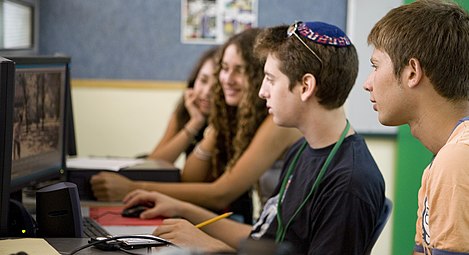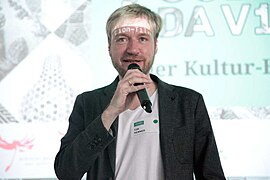User:MCruz (WMF)/Sandbox/Newsletter/2015/2/5/Draft
Frontpage[edit]
Topic 1[edit]
- Title: Capacity Development Framework: Phase 1
- Opening text (35 words):
- What needs do emerging Wikimedia communities have? Meet the Capacity Development Framework.
- Intro text: Participating communities:
- Images (3):
-
Indonesia & Philippines
-
México
-
South Africa
-
Turkey
-
Ukraine
-
India
-
Arab community
- Descriptive text (250-300 words max):
- The Wikimedia Foundation conducted qualitative research into strengths, challenges and needs of different communities. The aim? To further understand the breadth and scope of capacity needs in emerging communities. The first phase of this framework community research. To this end, interviews were conducted with sixteen emerging communities or countries through in-depth video interviews with a small group of community members. The research surfaced seven community capacities for development, based on the strengths, challenges or needs reported by those interviewed:
- New contributor engagement and growth
- Community governance:
- On-wiki technical skills
- Communications
- Partnerships
The report of this Phase 1 of Capacity Development Framework aims to define these seven capacities, in order to create a common vocabulary for future discussions, as well as to provide a non-exhaustive list of example actions for building these outlined capacities.
The second phase will focus on creating separate, on-wiki spaces for each of the seven capacities, with the specific aim of discussing and clarifying central problems, existing solutions (from other communities), and potential future work (e.g. research, trainings, facilitated meetings, etc.).
- Further reading (links):
Topic 2[edit]
- Title: New Evaluation report and toolkit on Writing Contests
- Opening text (35 words):
- A better understanding of Wikimedia Programs: Evaluation Reports 2015 and Program Toolkits.
- Intro text: Both products work together to advance movement-wide understanding of writing contests, their design, and their impact.
- Images (3):
- Descriptive text (250-300 words max):
We have completed the data collection phase for the Wikipedia Programs Evaluation Reports 2015, and the first reports have now been released. In collaboration with grantees and program leaders across the movement, the reports have begun to cover over 700 implementations of 10 different types of programs, reported by at least 98 different program leaders from 59 countries. This second round of data represents twice as many countries, more than three times more program leaders reporting, and six times more program implementations. The goals of these reports are:
- To develop a clearer understanding of Wikimedia programs and their impact.
- To identify positive examples of programs to explore in more depth, in order to develop best practices and support networks across communities
- To help Wikimedia community leaders explore methods for improving the data collection and reporting of their programs.
- To highlight key lessons learned that can be applied to data collection and reporting.
Currently online are the reports on Editathons, Writing Contests, Wiki Loves Monuments and Other photo events.
The latest report, focused on Writing Contests on Wikipedia, was launched in early July, and it was released together with a program toolkit. While the evaluation report offers data on goals, inputs, outputs and outcomes of writing contests, the program toolkit brings out process and some best practices about this program. It complements the evaluation report offering a practical guide, focused on implementation. Both products work together to advance movement-wide understanding of writing contests, their design, and their impact. Join the conversation! Program leaders have a key role to play in this enterprise as we work to build out the toolkit through shared experiences, success and challenges.
- Further reading (links):
Stay tuned[edit]
Blogs[edit]
- Blog 1:
- Descriptive text (70-80 words):
- Image
- Link
Suggest:
- Learning Day Blog
- Blog 2:
- Descriptive text (70-80 words):
- Image
- Link
Calendar[edit]
Grow the Awesome[edit]
Coding da Vinci the GLAM hackathon lasting 10 weeks. Organized by Wikimedia Deutschland, OKF, Deutsche Digitale Bibliothek and DigiS
-
Coding da Vinci Kick Off (25 & 26-04-2015) 005 Berlins state secretary for culture Tim Renner opening Coding da Vinci in April 2015
-
Coding da Vinci Kick Off (25 & 26-04-2015) 114 Coding da Vinci Coders working hard for their project
-
Coding da Vinci 2015 - Preisverleihung (18880680843 Happy winners and teams at the Coding da Vinci award ceremony in July 2015
Coding da Vinci is a slightly different GLAM hackathon. First, it is run by 4 partners. Wikimedia Deutschland, Open Knowledge Foundation, Deutsche Digitale Bibliothek and DigiS. Already the partnership represents the linking of two worlds. On one side art & heritage institutions and on the other side developers and volunteers. At Coding da Vinci they both meet. They talk to and learn from each other. Second it includes a sprint. In 10 weeks out of more than 600000 media files and 65 Million metadata entries roundabout 100 coders, designers and art fans created 20 new projects. And third it has a fancy award ceremony.
It was a tuff job to the jury to assign five prices. Out of competition was Rolling Stone, a web app making stones talk. Most funniest was considered the online game Nürnberger Lebkuchen based on old ginger bread recipes. The Most technical award was assigned to the combined hardware-software installation Kurbelkamera (crank camera) giving its user the chance to became a movie star in 100 year old movies and share the new film on the net. The app Midiola was awarded for Best design, giving sound to silent punch cards from mechanical pianos. And finally in the category most useful was the plant identifier app Floradex, using 175000 entries of the herbarium of Berlins Botanical garden, founded in 1819. It gained the prize from the audience Everybody's darling as well.
Wikimedia Deutschland funds Coding da Vinci because it animates GLAM institutions to define datasets under a free license. Many of them for the first time. We are integrating all this data into Wikimedia Commons. Coding da Vinci shows the potentials of free licenses to creativity. GLAMs can see the offspring of their collection in a new surrounding. This is motivating GLAMs shaping access to their collections compatible to Wikimedia Projects.
- The web site of Coding da Vinci
- An English summary
- A video presentation in English
Leave your mark on Meta[edit]
IdeaLab[edit]
- Idea 1
- Descriptive text (30-45 words):
- Image
- Link
- Idea 2
- Descriptive text (30-45 words):
- Image
- Link
Learning Pattern Library[edit]
- Pattern 1
- Descriptive text (30-45 words):
- Image
- Link
- Pattern 2
- Descriptive text (30-45 words):
- Image
- Link












